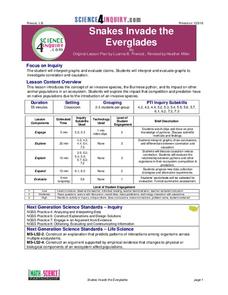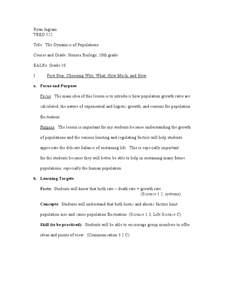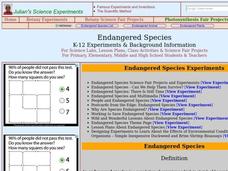Curated OER
Population Biology - Biology Teaching Thesis
Learners explore the effects of different density-dependent and density-independent factors on population growth. They explore how the interactions of organisms can affect population growth. Students explore the pattern of population...
Curated OER
Population Biology Case Study
Students are focused on the big question: What makes a population grow and how could that growth stop? They use these concepts to help answer the big question: carry capacity, density dependent v. density, independent factors, predation...
Curated OER
Population Biology
Students define the following terms: predation, competition, carrying capacity and population. They can explain the patterns of growth and the limitations of growth. Students explain the difference between density-dependent and...
Virginia Department of Education
Predator-Prey Simulation
Do your pupils have the misconception that environmental predators are "bad" and harm smaller creatures? The simulation explains, in detail, the important role predators play in maintaining a stable ecosystem. Through web-based research,...
It's About Time
Factors Affecting Population Size
How do we predict future population growth? Young researchers investigate various factors affecting the size of our population. As they calculate and interpret graphs to determine factors that could potentially affect increases...
LABScI
Population Dynamics: The Predator-Prey Lab
Wolves eat better when the bunny population increases, but how long does that last? A series of 12 biology lessons uses the sixth installment to explore the predator-prey relationship between bunny and wolf populations. Young scientists...
Curated OER
biology - 9th Grade
The clear cartoon style slides in this presentation contain details that affect population growth. Natural disasters and other external factors are listed as density independent factors, and density dependent factors, such as competition...
Science 4 Inquiry
The Ups and Downs of Populations
Life has its ups and downs ... especially if you're an animal! Biology scholars engage in a population study through an inquiry-based lesson. Pupils work together to explore the factors that affect deer populations, then examine the...
Curated OER
Deer: Predation or Starvation
In this balance of nature worksheet, students use a data chart to graph wolf and deer populations over a ten-year period. Students use this graph to complete 3 short answer questions.
Curated OER
Wildlife
First, biology pupils research land and marine habitats along the route of skipper Rich Wilson's Great American II. Then, using colored paper clips scattered across a colored paper background, they play the predator-prey game to...
Curated OER
Population Growth
Students grow duckweed, observe what happens when an organism population is allowed to grow without predation or competition, view videos about invasive species, and develop a proposal for controlling the growth of an invasive species in...
College Board
2014 AP® Biology Free-Response Questions
The most popular AP science exam, Biology, also maintains the highest passing rate. The College Board releases old test questions covering trichomes and much more, along with statistics and scoring guidelines to help scholars study for...
Curated OER
Predator-Prey Simulation
Students simulate the interactions between a predator population of lynx and a prey population of rabbits. They collect and graph the data, then extend the graph to predict the populations for several more generations.
Curated OER
Raven Chapter 54 Guided Notes: Community Ecology
Providing a sweeping overview of population and community interactions, this ecology worksheet gets learners thinking. They differentiate between habitat and niche, describe and give exemplars of various animal and plant defenses,...
Curated OER
Community Ecology
Chart ecological community interactions and answer questions about niche, defenses, trophic structure, and succession. This community ecology instructional activity provides a general overview of the interactions that occur among...
Curated OER
The Lynx Eats The Hare
Students investigate the predator and prey relationship. This is done using a simple simulation. The simulation is done as an arts and craft activity. Students record data and track it using a graphic organizer and then they discuss the...
Curated OER
Populations and Ecosystems
Sixth graders examine the factors that influence the stability of ecosystems. They construct a miniature ecosystem in a jar that includes plants, small fish, and snails, record the population changes over a period of four weeks, and...
Curated OER
Population Dynamics of Growth of Drosophila
Students investigate population dynamics such as variation in density of females, composition of food sources an environmental factors such as light and temperature on Drosophila. They then relate their findings to human populations and...
Science 4 Inquiry
Snakes in the Everglades
The Burmese python is on the loose ... and he's hungry! Illustrate the differences between causative and correlative relationships through an inquiry lesson. Pupils examine several sources of information to determine if there is a...
Curated OER
The Dynamics of Populations
Tenth graders analyze the growth rate of different population. In this biology experiment, 10th graders identify the biotic and abiotic factors that limit population size. They create a poster to show their findings in class.
Curated OER
Beetle Collection and Release
Young scholars investigate plants and compare them to the purple loose strife. As they observe the plants they predict possible impacts on plant populations based on their observations. They work in groups and present their findings to...
Curated OER
Ecology: Factors Influencing Animal Populations
Young scholars assess the factors affecting animal populations. Working in groups they define specific vocabulary terms and complete several activities from "Project Wild."
Curated OER
Endangered Species
Students create a postcard about endangered species. In this biology lesson, students identify how human activities endanger other species. They research and recommend ways to help protect them.
Curated OER
Marine Protected Areas (MPA)
Ninth graders explain the purpose of MPA's. For this biology lesson, 9th graders identify MPA's in Southern California. They simulate coastal sampling using candy from two buckets. Students analyze their results and share it with the class.

























